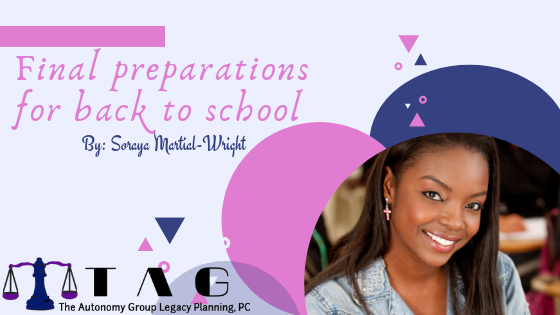Throughout the month of July, I have stressed on Social Media, that contrary to popular belief, estate planning starts at 18! In my last blog Is Your Baby Truly Ready, I told you that even if you are paying all of their expenses, you canNOT access financial and educational records, or make financial and medical decisions on your child’s behalf, without having consent or the proper documents in place. Yes, even if you went through 15 days of labor, doctors and bank representatives are not required or permitted to just give you access to your child’s records. According to federal law, your child becomes a legal adult at the age of 18. They may still be your baby, but they are solely in control of their finances, health, and potential assets. In Is Your Baby Truly Ready, I also told you how FERPA protects the privacy of students’ education records. By now, I’m sure most of you know about HIPAA (Health Insurance Portability and Accountability Act of 1996), which protects the privacy of a person’s medical records. Therefore, it’s important that all children 18 or older, whether they’re staying home, going away to college, or finishing their senior year of high school, have certain estate planning documents in place. Before you consider your back to school shopping complete, you should consider adding the following to the list:
Health Care Power of Attorney (HCPOA): You’re probably thinking, well, this is a child, and I’m the next of kin, and they’re not married. I shouldn’t have any issues getting access to their records or issues making decisions on their behalf. That’s not necessarily the case. Think about it. If your child, God forbid, is involved in an accident, and he/she ends up at a hospital, and you are hours away from them, do you think a medical professional will take instructions from you over the phone? No, they likely won’t. Without consent from that child or a legal document giving you authority to get access medical records and make medical decisions, you are NOT in control of anything. That’s where your HCPOA document would come into play. A properly executed HCPOA would not only give you access to your child’s medical records, but also appoint you as their agents so that you can make decisions on their behalf, no matter where you are. If your child doesn’t have a HCPOA, and he/she is unable to provide consent, you may not be able to take action of their behalf until you go to court and get the proper document from a Judge. Of course, we don’t want to think about the negative. Hopefully all will go well, and you’ll never have to worry about something like this. But if the unexpected happens, you’ll want to be prepared, and you’ll want to be able to take care of and make decisions for your child without delay.
Durable/Financial Power of Attorney (POA): Now, you may be thinking my child is broke, they don’t have any money. There are no finances to speak of. That may be true. However, without a properly executed POA, you will NOT be allowed to handle business on your child’s behalf. If they have a bank account, you can deposit money in it, but without the proper authority, you can’t have access to it. If they are in college, you can write a check to pay their tuition, but you will NOT have access to their school records. God forbid, if something happens to your college baby, and he/she is no longer able to continue his/her education, you may NOT be able to deal with the Department of Education and perhaps request a discharge of their student loans. With a properly executed POA, if your child becomes incapacitated and unable to handle his/her personal affairs, you will be empowered to act on his/her behalf.
Wills & Trusts: Unlike the other documents I mentioned above, a Will or Trust may not be necessary for every 18-year-old. However, there are situations where having one or both of these documents are appropriate. If your baby happens to be a parent, even if he/she has no assets to speak of, he/she should absolutely have a Will in place. Why? Because if something happens, your baby needs to designate who he/she wants to take care of his/her baby. This is especially important if there is an absent or inactive parent on the other side. Similarly, a Trust may not be appropriate for every 18-year-old. However, if for instance your baby received a large inheritance, and you don’t want him/her to blow it partying while in college, having a Trust in place would provide options, allowing you to put some parameters in place, so that he/she may have some of it left over to use after their 20’s.
I’ve said this many time before, and I’ll say it again, planning for the unexpected is a must! It’s better to be proactive than reactive. Take action now so that you don’t have a bad reaction later.



